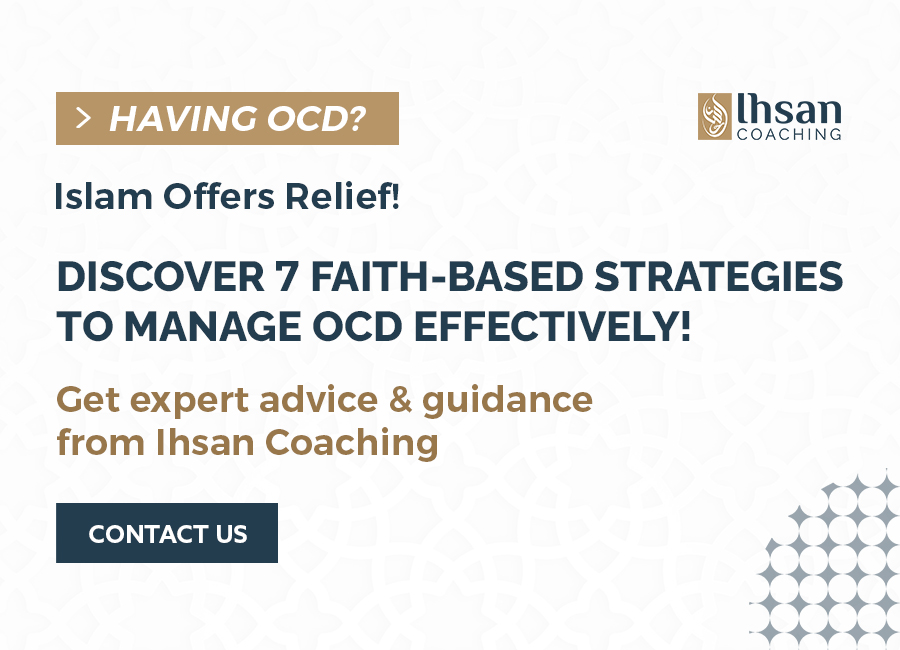Obsessive-Compulsive Disorder (OCD) is more than just a mental health condition; it’s a daily struggle that affects millions globally, including many in the Muslim community. Managing OCD can be uniquely challenging due to the interplay between religious practices and cultural expectations. Let’s delve into the intersection of OCD and Islam, offering insights on how Islamic teachings can provide solace and practical strategies for coping. Additionally, we’ll explore the benefits of seeking support from a Muslim OCD therapist who understands these cultural and religious nuances, ultimately paving the way for improved mental health and well-being.

Understanding OCD and Its Impact
What is OCD?
OCD is characterized by persistent unwanted thoughts (obsessions) and repetitive behaviors (compulsions) that an individual feels driven to perform. In the context of Islam, OCD can manifest in ways that interrupt religious practices, such as excessive washing before prayers (Wudu) or repeated prayers due to doubt of its correctness. It is important to note that OCD is a medical condition, not a spiritual failing or a lack of faith. Understanding this distinction can help reduce the stigma of the condition and encourage people to get appropriate help.
➡️ The Impact of OCD on Muslim Mental Health
To reinforce, living with OCD can be particularly challenging for Muslims due to the nature of their religious practices, which require a high level of spiritual and ritual purity. OCD can lead to increased anxiety, guilt, and even a strained relationship with one’s faith. Understanding the religious context is crucial for effective treatment and management.
➡️ Islamic Teachings on Mental Health
Islamic Perspectives on Mental Health promotes holistic well-being: The religion encompasses physical, mental, and spiritual health. Many Quranic verses and the Hadith of the Prophet emphasize the importance of mental health. For instance, the Prophet Muhammad (peace be upon him) has numerous times highlighted the significance of seeking treatment for illnesses, including illnesses of the mind.
In the Quran, Allah says:
“يَا أَيُّهَا الَّذِينَ آمَنُوا اسْتَعِينُوا بِالصَّبْرِ وَالصَّلَاةِ ۚ إِنَّ اللَّهَ مَعَ الصَّابِرِينَ”
“O you who have believed, seek help through patience and prayer. Indeed, Allah is with the patient.”
(Quran 2:153)
This verse underscores the importance of patience and prayer, which can be significant for those dealing with mental health challenges.
The Prophet Muhammad (peace be upon him) also emphasized the importance of seeking medical treatment:
“تَدَاوَوْا، فَإِنَّ اللهَ عَزَّ وَجَلَّ لَمْ يَضَعْ دَاءً إِلَّا وَضَعَ لَهُ دَوَاءً”
“Seek treatment, for Allah has created a cure for every illness.”
(Sunan Abi Dawood 3855)
This Hadith encourages Muslims to seek medical help for their illnesses, including mental health issues, reinforcing that seeking treatment is not contrary to faith.
Another important Hadith states:
“مَا أَنْزَلَ اللَّهُ دَاءً إِلَّا أَنْزَلَ لَهُ شِفَاءً”
“Allah did not send down a disease except that He also sent down its cure.”
(Sahih Bukhari 5678)
These teachings highlight the Islamic perspective that addressing mental health is part of a Muslim’s duty to maintain overall well-being. By seeking help and treatment, Muslims can fulfill their religious obligation to take care of their bodies and minds.
➡️ The Role of Faith and Spirituality
Faith can be a powerful source of strength and resilience for Muslims dealing with OCD. Islamic teachings promote mental well-being and offer guidance on managing stress and anxiety. For instance, the Quran encourages believers to seek patience and prayer as a means of coping with difficulties. Maintaining a balanced perspective on religious duties without succumbing to obsessive rituals is essential for mental health. Reflecting on the compassion and mercy of Allah can also provide comfort and reduce feelings of guilt associated with OCD.
➡️ The Role of Patience and Prayer
Patience (Sabr) and prayer (Salah) are central tenets of Islam that can provide comfort and strength to those dealing with OCD. Regular prayer can serve as a grounding practice, while patience helps in enduring and overcoming the challenges posed by OCD.
Practical Strategies to Overcome OCD

1. Seeking Knowledge and Understanding
Educating oneself about OCD is the first step towards managing it. Understanding that it is a medical condition and not a spiritual failure is crucial. Learning about how the illness affects the brain and behavior can demystify the disorder and reduce self-blame.
2. Cognitive Behavioral Therapy (CBT)
CBT is a highly effective treatment for OCD. It involves identifying and challenging negative thought patterns and behaviors. Working with a Muslim OCD therapist can help integrate religious and cultural considerations into the therapy process, making it more relevant and effective.
3. Exposure and Response Prevention (ERP)
ERP is a specific type of CBT that focuses on gradually exposing individuals to their fears and preventing the compulsive behaviors that follow. For example, a person with contamination fears might be encouraged to touch a “contaminated” object and refrain from washing their hands immediately.
4. Incorporating Islamic Practices
Integrating Islamic practices such as regular prayer, recitation of the Quran, and Dhikr (remembrance of Allah) can be soothing and help manage OCD symptoms. These practices can also serve as a form of mindfulness and stress relief.
5. Building a Support System
Having a strong support system is vital. This includes family, friends, and religious leaders who understand the illness and can provide emotional and spiritual support. Joining support groups, particularly those tailored for Muslims, can also be beneficial.
6. Consulting a Muslim OCD Therapist
A Muslim OCD therapist can provide culturally and religiously sensitive care. They can help navigate the intersection of faith and mental health, offering strategies that respect and incorporate Islamic teachings while addressing the symptoms.
7. Medication
In some cases, medication may be necessary to manage OCD symptoms. Consulting with a healthcare provider, preferably one who understands the religious context, can help determine the best course of action.
FAQs
What is the role of a Muslim OCD therapist?
A Muslim OCD therapist understands the religious and cultural context of their clients, providing tailored therapy that respects and integrates Islamic teachings while addressing the symptoms.
Can prayer help in managing OCD?
Yes, regular prayer can provide structure, reduce anxiety, and offer spiritual comfort, which can be beneficial in managing OCD.
Is OCD a sign of weak faith?
No, OCD is a medical condition and not a reflection of one’s faith or spirituality. It’s important to seek medical and psychological help to manage it effectively.
How can a family support a person with OCD?
Families can support by educating themselves about OCD, being patient and understanding, and encouraging their loved ones to seek professional help.
Are there any Islamic remedies for OCD?
While Islamic practices like prayer and Dhikr can provide comfort, professional treatment such as therapy and medication is often necessary for managing OCD.
Is it okay to take medication for OCD?
Yes, taking medication for OCD is acceptable and can be part of a comprehensive treatment plan. It’s important to consult with a healthcare provider.
Conclusion
Overcoming OCD is a journey that requires patience, understanding, and support. For Muslims, incorporating Islamic teachings and seeking help from a Muslim OCD therapist can provide a comprehensive approach to managing this condition. By combining religious practices with modern therapeutic techniques, individuals can achieve better mental health and a stronger spiritual connection. May Allah give us all the strength and resources to overcome illnesses.





